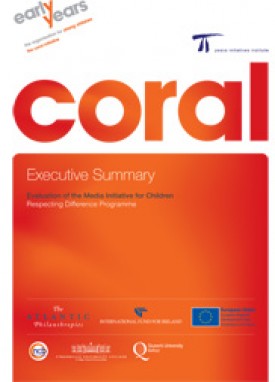Executive Summary of Findings from the Media Initiative for Children
Resource type: Evaluation
Early Years |
Young children who participated in a media programme to increase their awareness of diversity showed clear changes in their socio-emotional development, cultural awareness and inclusive behaviour, according to an evaluation by the Centre for Effective Education at Queen’s University Belfast. The randomised controlled trial examined the Media Initiative for Children, which targeted 3-4 year olds, their teachers and their parents in Northern Ireland and the Republic of Ireland.
The programme was carried out by Atlantic grantee Early Years, a non-profit organisation that promotes high quality childcare.
> Download the Executive Summary
> Download the Full Research Report
The Situation
Children begin to learn prejudice as young as 3 years old. For children in Northern Ireland, the prejudice can extend to Protestants or Catholics, immigrants and those who are disabled, among others. Research has found that to combat bigotry and racism, youngsters in divided societies need specially designed educational programmes.
What We’re Doing
Atlantic is supporting an innovative organisation that uses a combination of cartoons, puppets, curriculum, training and support to help young children see one another without labels or bias. A randomised controlled trial of the programme found strongly positive effects in children, parents and teachers.
Early Years is a non-profit organisation that promotes high quality childcare for children aged 0 – 12 and their families. As part of its work, Early Years and the Peace Initiatives Institute created a programme aimed at children aged 3-4 years old that seeks to increase awareness of diversity and difference issues among young children, early childhood practitioners and parents. The Media Initiative for Children Respecting Difference’s goal is also to promote more positive attitudes and behaviours towards those who are different.
Playing the Same Game: This cartoon aims to foster acceptance and respect for those from different traditions that have often been associated with sectarianism. © Cartoon copyright of the Peace Initiatives Institute
Engaging Meaningfully with Parents and Communities: The Media Initiative for Children offers workshops to help parents develop and promote positive attitudes to physical, social and cultural differences. In this video, workshop participants note that, even when their behaviour is accepting of others (particularly the religious sectarian divide), children pick up their words and begin to see the world in divided terms.
The Findings
Atlantic supported one of the largest randomised controlled trials ever conducted of this type internationally. The evaluation involved 74 pre-school settings implementing the initiative that were selected randomly from settings in Northern Ireland and the Republic of Ireland. A total of 1,181 children participated in the evaluation, along with 868 parents and 232 practitioners.
An October 2010 evaluation report found “clear evidence that the Media Initiative for Children achieved positive effects regarding children’s attitudes and awareness” in relation to their:
- Socio-emotional development (e.g., increased ability to recognize how being excluded makes someone feel).
- Cultural awareness (e.g., increased ability to recognise the Irish Tricolour flag or the British Ulster flag).
- Inclusive behaviour (e.g. increased desire to join in a St. Patrick’s Day Parade or an Orange Parade).
- For more details, see the evaluation report.
Next Steps
As a result of the evaluation findings, Early Years is taking this programme to scale across its network of 1200 members in Northern Ireland and the Republic of Ireland with support from the government and the European Union. The programme has also generated considerable interest from post conflict societies and Early Years will roll out the programme in Serbia, to complement is work in Albania and the Ukraine. In addition, Early Years has received $15 million in funding to collaborate with a partner in Turkey to roll out the media programme there, among other work.
Learn More
- Additional information on The Early Years’ Media Initiative for Children
- Press Release on Evaluation Findings
- Initial Findings from The Peace Initiative Institute on the impact of community attitudes and behaviour on young children in Northern Ireland.
- Research Report: Sectarianism, Children and Community Relations in Northern Ireland
